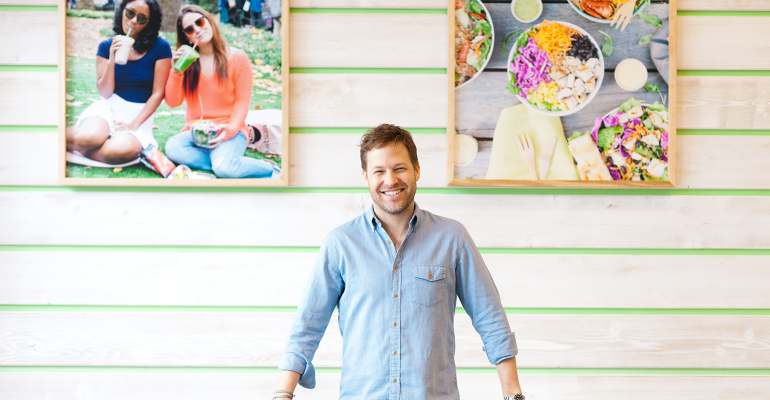When Nick Kenner worked in finance, in New York, he and his colleagues often complained about the quality of the salads they ate for lunch.
At the time, Subway was positioned as “a symbol of health,” he said. But Kenner thought he could do better, so he founded Just Salad in 2006.
This year, the 32-unit fast-casual chain broadened its menu and began rolling out a new prototype design and online ordering. Just Salad has also received a minority investment from Panda Restaurant Group, the parent of Panda Express.
Additionally, Just Salad has a unique approach to cutting back on waste with reuseable salad bowls for customers.
Kenner described the recent evolution of Just Salad:
How does Just Salad cut back on waste?
We have the most successful reusable program in the country, maybe the world, based on our customers being willing to reuse their salad bowl because of the incentives we give them.
A customer will buy a bowl for $1 at any location, but each time they reuse that bowl, they get two free essentials or a free premium, like cheese or avocado, so they can save up to $1.50 per visit. We save over 75,000 pounds of plastic every year because thousands of customers do it.
Does it help reduce costs in other ways?
We save roughly 25 cents on the plastic bowl, but the cost of the items they receive for free do cost more than the bowl itself. So you could call it a money-losing proposition. But we do feel that this is who we are, and it’s a big part of what we stand for, and it’s important to continue for two reasons.
One is we really want to genuinely reduce our impact. And Just Salad is about making healthy affordable, and this is another way to make it affordable for those who want to save $1 to $1.50 each ticket. From a sales perspective, a lot of customers do come to us more frequently because they feel better about saving money or reducing their plastic intake.
Do you see Just Salad as a national brand?
We consider ourselves a small national brand that will grow into a very large national brand. We feel there’s room for at least 1,000 locations.
I look at Chipotle Mexican Grill and Panera Bread, which are closer to the 2,000-unit level, and I think we can have half the amount. Not to say it’s easy, but with the right team you can execute.
There are a bunch of people in this healthy fast-casual category that five, 10 or 15 years from now will all be national, and it will be similar to the number of burger and pizza players. You will see this category have a huge national presence.
How does the investment from Panda Restaurant Group help?
Panda made their first investment in 2014. We were looking to go national and we knew we needed help, so wanted to bring in a partner with expertise. We looked at the largest restaurant companies in terms of operators: Starbucks, Chipotle and Panda Express was No. 3. We felt given their infrastructure and given their ability to execute at a high level, we thought they could help us a lot, and we were right. They’ve been a tremendous help to us.
Besides capital, what else do they bring?
I just came back from a Panda leadership conference, which they have twice a year. Generally, from a cultural standpoint, how they recruit, retain and motivate employees, whether at the corporate or store level, we’ve taken a lot from them.
There have been a lot of big macro takeaways. The Cherngs and their chief financial officer, David Landsberg, are just great at coaching, and we could use that coaching. When we activated the investment, Andrew Cherng came and said, ‘My job is to help you not make the mistakes we did along the way.’ That’s such an incredible thing to hear from someone as successful as the founders of Panda.
Correction: June 9, 2017 An earlier version of this story misstated Just Salad's unit count. The chain has 32 units.
Contact Lisa Jennings at [email protected]
Follow her on Twitter: @livetodineout





